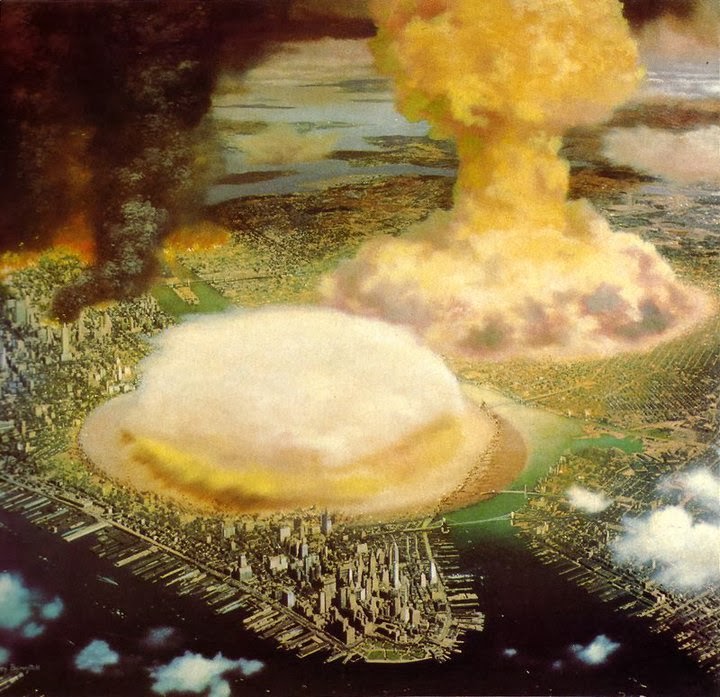1 I or He or It (the Thing) Which Thinks
The Noir Subject...
One way to take note of the historical gap separating the 1980s from the 1950s is to compare the classic film noir to the new wave of noir in the eighties. What I have in mind here are not primarily direct or indirect remakes (the two DOA's; Against All Odds as a remake of Out of the Past; Body Heat as a remake of Double Indemnity; No Way Out as a remake of The Big Clock, etc., up to Basic Instinct as a distant remake of Vertigo) 1 but rather those films which endeavor to resuscitate the noir universe by way of com' bining it with another genre, as if noir today is a vampirelike entity which, in order to survive, needs an influx of fresh blood from other sources. Two cases are exemplary here: Alan Parker's Angel Heart, which combines noir with the occult-supernatural, and Ridley Scott's Blade Runner, which combines noir with science fiction.
Cinema theory has for a long time been haunted by the question: is noir a genre of its own or a kind of anamorphic distortion affecting different genres? From the very beginning, noir
was not limited to hard-boiled detective stories: reverberations of noir motifs are easily discernible in comedies (Arsenic and Old Lace), in westerns (Pursued), in political and social dramas (All the King's Men, The Lost Weekend), etc. Do we have here a secondary impact of something that originally constitutes a genre of its own (the noir crime universe), or is the crime film only one of the possible fields of application of the noir logic? That is, is noir a predicate that entertains toward the crime universe the same relationship as toward comedy or western, a kind of logical operator introducing the same anamorphic distortion in every genre to which it is applied, so that finding its strongest application in the crime film turns on nothing but historical contingency? To raise these questions in no way means indulging in hairsplitting sophistry: our thesis is that the "proper," detective noir as it were arrives at its truth -- in Hegelese: realizes its notion -- only by way of its fusion with another genre, specifically science fiction or the occult.
What, then, do Blade Runner and Angel Heart have in common? Both films deal with memory and subverted personal identity: the hero, the hard-boiled investigator, is sent on a quest whose final outcome involves discovering that he himself was from the very beginning implicated in the object of his quest. In Angel Heart, he ascertains that the dead singer he was looking for is none other than himself (in an occult ritual performed long ago, he exchanged hearts and souls with an ex-soldier, who he now thinks he is). In Blade Runner, he is after a group of replicants at large in L.A. of 2012; upon accomplishing his mission, he is told that he is himself a replicant. The outcome of the quest is therefore in both cases the radical undermining of self-identity masterminded by a mysterious, all-powerful agency, in the first case the Devil himself ("Louis Cipher"), in the second case the Tyrell corporation, which succeeded in fabricating replicants unaware of their replicant status, i.e., replicants misperceiving themselves as humans. 2 The world depicted in both films is the world in which the corporate Capital succeeded in penetrating and dominating the very fantasykernel of our being: none of our features is really "ours"; even our memories and fantasies are artificially planted. It is as if Fredric Jameson's thesis on postmodernism as the epoch in which Capital colonizes the last resorts hitherto excluded from its circuit is here brought to its hyperbolic conclusion: the fusion of Capital and Knowledge brings about a new type of proletarian, as it were the absolute proletarian bereft of the last pockets of private resistance; everything, up to the most intimate memories, is planted, so that what remains is now literally the void of pure substanceless subjectivity (substanzlose Subjektivitaet -- Marx's definition of the proletarian). Ironically, one might say that Blade Runner is a film about the emergence of class consciousness.
This truth is concealed, in one film metaphorically, in the other metonymically: in Angel Heart, corporate Capital is substituted by the metaphorical figure of the Devil, whereas in Blade Runner, a metonymical impediment prevents the film from carrying out its inherent logic. That is to say, the director's cut of Blade Runner differs in two crucial features from the version released in 1982: there is no voiceover, and at the end, Deckard (Harrison Ford) discovers that he also is a replicant. 3 But even in the two released versions, especially in the version released in 1992, a whole series of features points toward Deckard's true status: strong accent falls on the visual parallelism between Deckard and Leon Kowalski, a replicant questioned in the Tyrell building at the beginning of the film; after Deckard proves to Rachael (Sean Young) that she is a replicant by quoting her most intimate child-recollections she did not share with anyone, the camera provides a brief survey of his personal mythologies (old childhood pictures on the piano, his dream-recollection of a unicorn), with a clear implication that they also are fabricated, not "true" memories or dreams, so that when Rachael mockingly asks him if he also underwent the replicant test, the question resounds with ominous undertones; the patronizing-cynical attitude of the policeman who serves as Deckard's contact to the police chief, as well as the fact that he makes small paper models of unicorns, clearly indicates his awareness that Deckard is a replicant (and we can safely surmise that in the true director's cut he viciously informs Deckard of this fact). The paradox here is that the subversive effect (the blurring of the line of distinction between humans and androids) hinges on the narrative closure, on the loop by means of which the beginning metaphorically augurs the (end (when, at the beginning of the film, Deckard replays the tape of Kowalski's interrogation, he is yet unaware that at the end he will himself occupy Kowalski's place), whereas the evasion of the narrative closure (in the 1982 version, the hints of Deckard's replicant status are barely perceptible) functions as a conformist compromise which cuts off the subversive edge.
How, then, are we to diagnose the position of the hero at the end of his quest, after the recovery of memory deprives him of his very self-identity? It is here that the gap separating the classical noir from the noir of the eighties emerges in its purest form. Today, even the mass media is aware of the extent to which our perception of reality, including the reality of our innermost self-experience, depends upon symbolic fictions. Suffice it to quote from a recent issue of Time magazine: "Stories are precious, indispensable. Everyone must have his history, her narrative. You do not know who you are until you possess the imaginative version of yourself. You almost do not exist without it." Classical noirs remain within these confines: they abound with cases of amnesia in which the hero does not know who he is or what he did during his blackout. Yet amnesia is here a deficiency measured by the standard of integration into the field of intersubjectivity, of symbolic community: a successful recollection means that, by way of organizing his life-experience into a consistent narrative, the hero exorcizes the dark demons of the past. But in the universe of Blade Runner or Angel Heart, recollection designates something incomparably more radical: the total loss of the hero's symbolic identity. He is forced to assume that he is not what he thought himself to be, but somebody-something else. For that reason, the "director's cut" of Blade Runner is fully justified in dispensing with the voice-off of Deckard (homophonous with Descartes!): in the noir universe, the voice-off narrative realizes the integration of the subject's experience into the big Other, the field of intersubjective symbolic tradition.
One of the commonplaces about the classic noir sets its philosophical background in French existentialism; however, in order to grasp the implications of the radical shift at work in the noir of the eighties, one has to reach back farther, to the Cartesian-Kantian problematic of the subject qua pure, substanceless "I think."






































